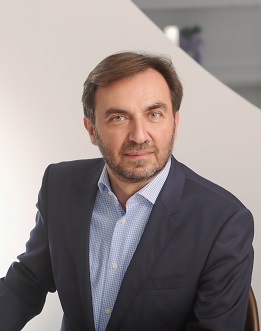Keynotes and special guests
Keynote speakers
Throughout the week, five keynote speakers addressed the conference theme from their experience and reflected on the role of ecosystem services in empowering people and societies.
Click the presentation titles below to view presentations in PDF. All the plenary recordings can be found here.
- Mary Yannakoulia (Monday)
The Mediterranean Diet: a nutritional, environmental, social and cultural value
- Eszter Kelemen (Tuesday)
- Esther Turnhout (Wednesday)
Transforming ecosystem services research
- Roy Bendor (Thursday)
From the crisis of imagination to more-than-human imaginaries
- Ana Vitoria de Magalhães (Friday)
Special guests
- Georgios Alexakis, Region of Crete, Greece
- Bas Kohler, Live drawing, Netherlands
- Ecological Movement of Heraklion - recipient of CO2 compensation credits
Below you find the short CVs of our esteemed keynote speakers and more information on our special guests.
Biographies
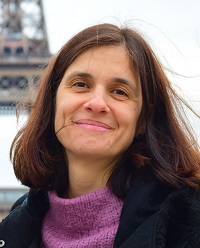
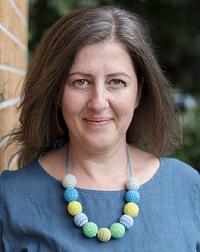
skills in social scientific, participatory, and deliberative techniques which help her facilitate knowledge co-creation processes. She has been engaged in the work of the Intergovernmental Science-Policy Platform on Biodiversity and Ecosystem Services (IPBES) since 2014, first as a member of the Values Expert Group, later as a Lead Author of the Global Assessment, and then as a Coordinating Lead Author of the Values Assessment.
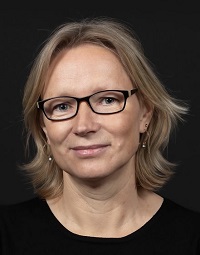
These experiences have sparked an interest in exploring ways to transform environmental and sustainability science to support and contribute to transformative change and human and ecological well-being. She has published numerous articles on the biodiversity science-policy interface and other topics in high impact journals, she is the first author of the book ‘Environmental Expertise: Connecting Science, Policy and Society’ with Cambridge University Press and she is co-editor in chief of the interdisciplinary journal Environmental Science and Policy.
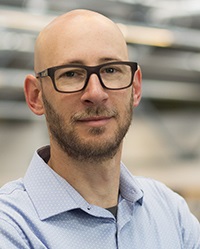
Find out more about him on his website www.digitalsustainability.com
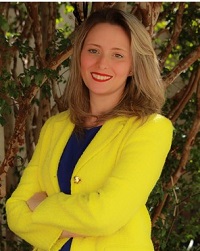
Ana has a background in Marine Spatial Planning by the International Itinerant Master Erasmus Mundus and is currently following a post-graduation in Diplomatic Studies by Ibmec Brazil. She is an enthusiast of ocean literacy, science, culture, and education and is honored to work in cooperation with the Ocean Literacy community worldwide with IOC-UNESCO. Her path includes passages in different countries such as Spain, Italy, Belgium, the island of São Miguel in the Azores in Portugal and France. The different experiences provided her the background to understand the world from other lenses and supported her path as an international professional.
George Alexakis, Vice Governor of Crete in charge of European and International Affairs, has been elected in 2010 and re-elected in 2014 and in 2019. Previously, he was continuously elected during the four consecutive elections’ periods from 1994-2006, as a Prefectural Councilor of Heraklion, Crete, Greece.
Since 2014, he holds the position of the Vice-President of CPMR (Conference of Peripheral Maritime Regions of Europe) in charge of Maritime Affairs, while he is a member of the Political Bureau of CPMR since 2012. On November 2020, he was elected as Vice President of EUROMONTANA Network.
George Alexakis holds a Diploma Degree on Civil Engineering from the Democritus Technical University of Greece, as well as a Master of Science on Planning, from the London School of Economics and Political Science.
In 1991, he started his own private career as a Civil Engineer and City Planner and as an Environmentalist, and has studied, prepared and been involved in more than 100 projects in a variety of sectors, having experience in European Projects, European Strategies and Regional Policies. From 2001 until 2014, he has been appointed as the Chief Executive Officer of Heraklion Port Authority, Crete, Greece. He is also a member of Regional Innovation Council of Crete, and member of the Administrative Council of the Organization for Development of Crete.
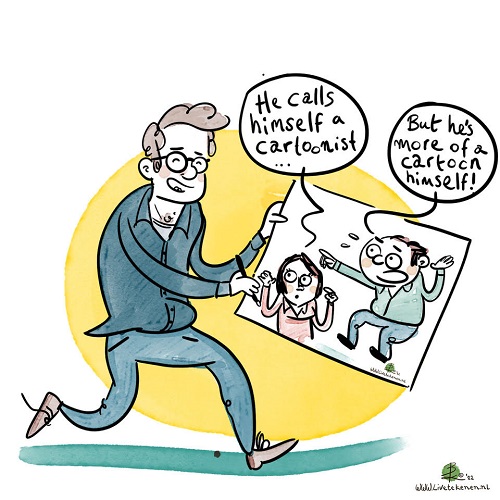
By live drawing I mean drawing at meetings, on site or via video connection. Listening at what is said and meanwhile reflect on that drawing cartoons. These cartoons I show to the audience at a specific moment during the meeting. Afterwards the cartoons can be used in reports and articles.
The power of live drawn cartoons is that people see what they just have heard (or accidentally missed). Good cartoons are about the content and emphasize specific perspectives. The cartoons put on the agenda, help to grap, expose and remember.
Being a young boy I already gave funny comments with drawings at school. It wasn’t often much thanked by teachers, for the rumor it caused in their classroom. Much later, studying Urban planning at University, it turned out that my drawings where not only fun but also useful. Drawing seemed a great way to get the grips on the material and to forcefully convey substantive ideas.
After graduating from my Masters, I followed a year on cartoon drawing at Escola Joso in Barcelona to improve my skills. So back in Amsterdam I started my drawing studio and almost automatically continued with what seemed to be Live cartoon drawing. First in theaters, then at governmental organizations, during conferences and in companies. I made my work of what I previously was sent out of the class for.
More: www.livetekenen.nl
Ecological Movement of Heraklion
The carbon offsetting credits that are gathered during the conference are going to the Ecological movement of the city of Heraklion (https://www.ecoher.gr/), an NGO which consists of citizens, scientists and regional experts who jointly deal with environmental sustainability.
ESP Europe 2022
 Registration website for ESP Europe 2022
Registration website for ESP Europe 2022Ecosystem Services Partnershipconference@espconference.org
Ecosystem Services Partnershipconference@espconference.orghttps://www.espconference.org/europe22
2022-10-10
2022-10-14
OfflineEventAttendanceMode
EventScheduled
ESP Europe 2022ESP Europe 20220.00EUROnlineOnly2019-01-01T00:00:00Z
To be announcedTo be announced
